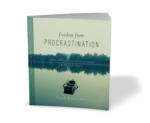Podcast: Play in new window | Download (Duration: 18:09 — 15.0MB) | Embed
A few weeks ago, I asked members of my Facebook page if they were afraid of failure. I was overwhelmed by the responses. It seems that I’m not the only one out there who fears failure! In today’s episode of the Christian Habits Podcast, we’ll talk about seven steps you can take to overcome fear of failure. But first let’s look at some of the things we’re afraid of.
Examples of Fear of Failure
Here are just a few of the examples Facebook readers gave of the areas where they were afraid of failure.
- Trying weight loss again after so many defeats.
- Messing up at work.
- Trying to be social and being or feeling rejected.
- Starting your own company and having it not work.
- Making decisions because you might make the wrong one.
- Deciding to resign and stay at home with the kids.
- Losing weight and then gaining it back.
- Raising kids.
There’s no end to the things we could come up with in the fear of failure arena. Let’s take a look at how to overcome fear of failure.

- To listen or subscribe on Apple Podcasts: click here
- To listen or subscribe on Android: click here
- To listen or subscribe on Stitcher: click here
- To listen or subscribe on Google Play: click here
- To listen or subscribe on Spotify: click here
How to Overcome Fear of Failure
1. Find out what you’re afraid of and why you’re afraid of it.
We can’t fight something until we know what we’re fighting. Thus the first step in overcoming fear of failure is to ask yourself, “What am I most afraid of?” and “Why am I afraid of that?”
Naming your fear will help you take the next step which is to evaluate your fear.
Here’s an example: I’m afraid whenever I publish a new book. When I ask the question, “What am I most afraid of?” my answer is that I’m afraid someone will write a horrible review on Amazon berating me up and down for how terrible my book is.
When I ask the next question, “Why am I afraid of that,” I answer with “then no one else will buy my book” and “all of my friends and family will read the negative review and think I’m a loser.”
I’m not the only author with these fears, but there are many who don’t feel this way. I was talking to one very successful artist a few months ago and he told me that every time he finishes a painting he thinks its great and that everyone will love it. By the time I finish a book, I usually think it’s terrible and that everyone will hate it. This is probably the main reason I’m so bad at doing book launches – I’m afraid to put the new book out there.
Often our fears are shaped by our childhood. When I was young, I had two different experiences where I did something in a public way and got yelled at for not doing it perfectly enough. Thankfully, God has given us wonderful brains we can use to evaluate those things we believe and see if they’re true. This leads to the next step.
2. See if your fears are realistic.
When we have a nameless fear it’s pretty easy to be convinced that what we fear will take place. But when we name it, we often realize that oh, that’s probably not going to happen. This is helpful. For example, when I tell myself there’s a less than 1% chance of my fear coming true, it’s easier to see that it’s ridiculous to worry about it. And easier to stop worrying.
Let’s see how this works with my publishing example: Is it true that no one else will buy my book if I have a terrible review for it? No, that’s not true unless 1) all of the reviews for the book are bad or 2) there aren’t enough good reviews to counteract the bad ones.
It’s also true that God is really in charge of all of this, not me, and my only responsibility is to do my best to write the book He wants me to write. The rest is up to Him.
Is it true that all of my friends and family will think I’m a loser if there’s as terrible review? No! First of all, I would guess that none of them even read my reviews – and if they did, they’ll feel sorry for me and love me – not berate me and think I’m terrible.
This is true for you guys, too. If you fail in a public way, people will still love you. Most people will be compassionate and feel bad for you. People care far more about your character and how you interact with them than they care about how successful you are in some arena of life. That said, it’s still possible that people will judge you if you fail or that there will be other consequences of failure. That’s why we need the next step.
3. Hold success with open hands (or let go of your have-to-haves).
We’ll never be able to let go of the fear of failure if we’re not willing to have our fears come true. When we set out to do something scary, there’s no “guaranteed success with the project” option. We have to step into the project knowing we could fail. Because of that, the more we hold success with open hands, willing to fail, the less scared we’ll be. It will be easier to do this if we take the next step.
4. Look at your fears from a biblical perspective.
Here’s what happens when we look at our fears from a biblical perspective: we usually realize that we’ve been barking up the wrong tree. We’re either caring about things God doesn’t care about (like looking good in the eyes of the world) or caring too much about things God does care about.
In my example, God just wants me to love people and serve them by writing. His definition of success is so much easier than my own definition because I’m successful each day I work on the book and the minute I publish it. Even if I get a million bad reviews and no one buys the book. I’m also successful even if I don’t write – which leads to the next point:
5. Find your identity in who you are rather than what you do.
Try to remember that whatever you’re trying to succeed at – that’s just a little part of who you are.
So for example in my case, I’m not only a writer. I’m a child of God. He loves me and created me as a unique person, different than everyone else. It can help to look at those differences because they’re part of who we are.
So in my case, I’m not just a writer. I’m also an outdoorsy person who loves to hike and camp and backpack and kayak and ski. I’m a wife and a retired homeschool mom with four kids. I’m also a person who loves to read and play games. And I’m an extrovert who loves meeting new people and visiting with them.
Writing is just one of the things I do, it’s not who I am.
6. Remember that the spirit-controlled you is better than the non-spirit-controlled you, but that’s a work in progress for all of us.
It’s also helpful to remember that we’re all works in progress. Often our sinful and fragile human selves show through. People see things in us that are worthy of condemnation. They may speak those things and they may be true. But rather than beating ourselves up, we can go to God for comfort, strength, perspective, love and finally, for help to change those things that need to be changed. That’s why it’s so important to take this last step:
7. Keep your eyes on Jesus.
As you work on your goals, try to remember that Jesus is the main goal. Hebrews 12:2 tells us to “fix our eyes on Jesus, the author and perfecter of faith, who for the joy set before Him endured the cross, despising the shame, and has sat down at the right hand of the throne of God.”
Jesus knows what it’s like to experience failure in the world’s eyes. But his failure led to great success for all of us in being willing to come to God and have our sins forgiven. That’s what’s really important in life – not success with our projects. If God wants us to succeed, He’ll help us succeed. And if we don’t succeed, it’s not a big deal because Jesus is the our main goal. And we already have Him!
More Help
If


I listened to this podcast again today as I am facing a big decision and am afraid of making the wrong choice. It really helped me renew my mind! I realized the biggest part of the decision has already been made During my meditation , prayer and renewing my mind otherwise, God has shown me the way to go. What I am needing to decide now is important but God will help me with this too. He is so faithful! Thank you for this most helpful reminder and instruction. Love the podcasts!!
Oh I’m so glad you spent that time in prayer and renewing, Virginia, and are feeling more settled about the decision. I know how hard indecisiveness is. Glad that God has shown you the way to go!